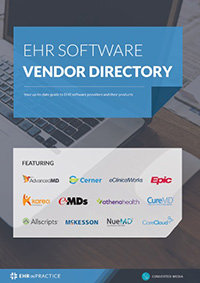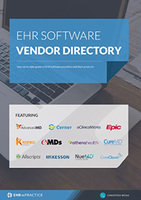Should your practice switch to a cloud EHR?
The debate surrounding the merits of cloud versus the traditional on premises server-based method of EHR deployment are guided partly by the idea that cloud-based deployment is the way forward in EHR technology. Most arguments in favor of cloud-based EHR can be countered by an equally persuasive case for on premises EHRs. Ultimately the decision boils down to practical considerations. As such it is a matter of finding the best fit for your practice. A number of considerations may sway a practice in either direction.
Budget considerations
Healthcare providers are constrained by budgets whose margins in the future may become more difficult with changes in reimbursement schemes. Although evidence provided by the government indicates that cloud based systems may be less expensive to implement the total cost of ownership when compared to an on premises system is slightly more. For practices that may not want to incur startup costs cloud based systems provide a more workable option. Whereas on-premise EHRs require physical servers to store data, which involves installation of hardware, software and maintenance costs upfront. Although the evidence cited above indicates the total cost of ownership over the long term for an on-premises system may be less there is still the risk that as servers age or develop faults they may require unexpected repair or replacement.
Recommended reading: find cloud EHR vendors with our extensive EHR vendor directory.
Scalability
Practices that are as big as they want to be will likely not be concerned with scalability, thus having an on premises system with an internal network configured for a certain number of staff may not be an issue. However for practices that may anticipate scaling up to more service lines and more staff a cloud-based system may be more in line with their organization’s goals as a cloud system can be expanded with relatively little effort and cost when compared to an on-premises system.
Internet speed and reliability
Cloud-based EHRs rely on an internet connection to access the EHR software and to retrieve data. Therefore, practices that do not have access to a reliable high-speed internet connection may be betters serviced using an on-premises system. The slow or unreliable internet can cause cloud-based EHRs to experience lag time in system functionality and may experience outages, which will prevent both the platform and data from being available. Providers in remote areas that feasibly cannot be serviced by high speed networks may wish to consider if their current network capabilities are in line with the cloud-based system’s requirements. In this case, an on-premises system may be a better fit. However, for practices in an area with access to higher speed internet a cloud-based or on-premises network would be suitable.
The debate over cloud-based or on-premise EHRs really should be dictated by considerations internal to a practice and not opinions of third parties who quite likely may be trying to sell a particular product. Although the two types of EHRs are functionally different, stark qualitative differences between the two systems are not apparent. Thus, a provider should ultimately consider in this debate what will best serve my practice.
Free white paper

EHR Vendor Directory
Get the most up-to-date directory of EHR software vendors. Find the best software for your practice.

Featured white papers
Related articles
-

EHR requirements and key features: your complete guide
Our extended guide to EHR requirements - everything you need to know and more on the subject
-

5 key stakeholders in your EHR selection
Learn about the individuals that, when consulted early and often, can make your EHR selection pro...
-

5 important areas of EHR training during implementation
Successful EHR implementation is not possible without crucial EHR training




